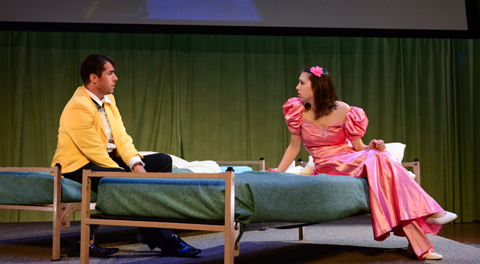 TRUE COLORS Doug and Kayleen are lifelong sparring partners in Gruesome Playground Injuries. |
Kayleen (Jessica Miller) and Doug (Ryan Salvato) first meet when they’re both eight years old and in the school nurse’s office: She has a stomachache, and he has “broken his face” whilst riding his bike off the school roof. Their bond, though awkward and cantankerous, is thus immediately grounded in the grisly intimacy of trauma. And the stakes of their wounds only increase over the next 30 years, in Gruesome Playground Injuries, a story of star-crossed, mangled love by Pulitzer Prize-winning playwright Rajiv Joseph, and directed by Kent Stephens for his STAGE FORCE, at the STAR Theater in Kittery.
The show’s most distinguishing element, as it skips back and forth in time and between hospitals, is a visual conceit: in order to heighten the pair’s already hyperbolic hurts, the script calls for the actors to perform their own costume and make-up changes (including broken-face and blown-out-eye effects) onstage. In Stephens’ production, Miller and Salvato do so on either side of the STAR’s spacious stage, where their mirrors are picked up by live video feed and projected onto the looming 10-by-20 foot screen. That same screen also establishes each scene’s setting with a still image (Kayleen’s bedroom filled with stuffed animals, an overgrown parking lot), an effect that fights a little with the simpler visual idiom of the set itself (a bed, a set of steps); the image might be better displayed once, then removed from view once the actors resume.
Those actors gamely cover the wide age range of their characters, and though their young Kayleen and Doug sometimes feel a little stylized (Doug bouncing on his heels; the amplified childlike phrasing of their talk), in their more affecting moments they also reveal interesting ambivalence and contrast. Miller gives Kayleen moments of physical gracelessness that feel endearingly true, as if she’s still getting used to being in her body, and Salvato does some fine intonation work: when Kayleen asks incredulously whether Doug really rode his bike off the roof, he responds with a proud, laugh-laced “Yeah”; later, when she asks whether his stitches hurt, his “Yeah” is darker, more mystified, both a little afraid and a little fascinated.
During their transitional scenes, Salvato and Miller add their wounds or hospital garb in character, at either side of the stage and relatively far from both each other and us. In contrast, when Injuries ran last year at SPACE, Sean Mewshaw staged it in a three-quarter round, with the actors making themselves up in tense deadpan and mere inches from some audience members. Where the effect at SPACE was taut and almost claustrophobically intimate, at the STAR the transitions feel less visceral and more cinematic, like watching a trailer of the next scene rather than watching characters grimly enact their own fates.
As those fates play out, Salvato engagingly mixes up his pride, fear, nonchalance, embarrassment, and resignation about his own injuries. From Kayleen, the script calls for a lot of shrill, doth-protest-too-much overreaction to Doug’s affections—a lot of “Fuck you” and “You’re stupid”—and sometimes this happens at a level of intensity too long sustained. Miller is at her best, rather, when Kayleen is more restrained and complex, whether moody and sensitive after a bad sexual encounter, or zonked but knowing after a grotesque episode of self-harm. Both actors are often especially moving when they stop talking altogether, as when we watch eighteen year-old Kayleen watch Doug inspect the razor she uses to cut, or when, as eight year-olds, they peer together into a bucket of their mingled vomit.